I told my Bread Chef that I’d write something about the Bread Class. That was 2 weeks ago. The post is still pending, no thanks to the 326 photos I took during the class itself. Ploughing through them would probably take longer than making a sponge and dough bread. But a promise is a promise, so I guess I’ll post some pictures of our beloved Bread Chef first. And also to check if anyone else in the school is reading this…..
This is our hardworking Bread Chef Mr Lim. Hardworking because he has to constantly watch over all our products, lest they burn, deflate, over proof, over beat or get themselves into some calamitous situation.
He has to cook curry for us (okay for the curry buns), cuz I mean we don’t know how to cook curry right? This is a baking class wat.
He even has to slice our cinnamon buns for us because we are busy taking photos. 🙂
But it’s pay back time during the exams lah. This was taken during our mid-term bread practical exam. Mr Lim is giving me the WTF, can you be serious for once, your bread sux look.
Calm before the storm….
Oh oooo…he spotted an error. So much for the smiley face on the bun. Didn’t fool him.
To be continued……
To read more about my baking school exploits, click here.
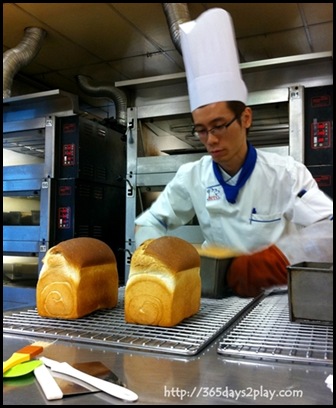
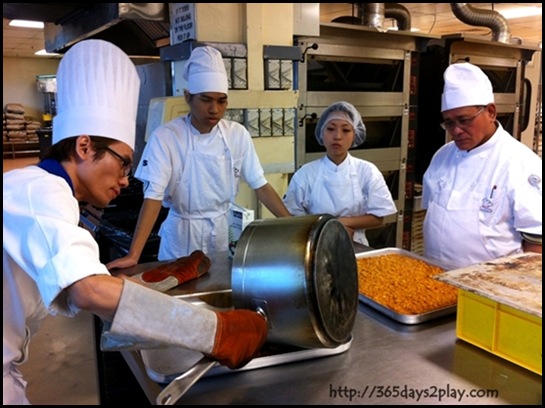
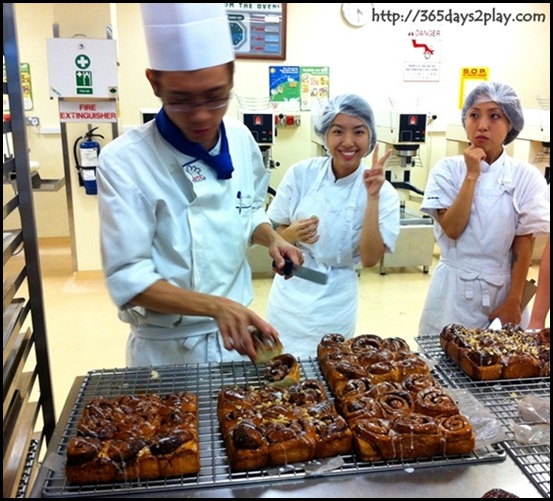
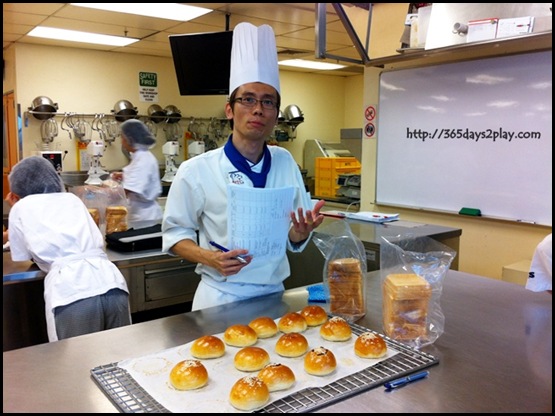
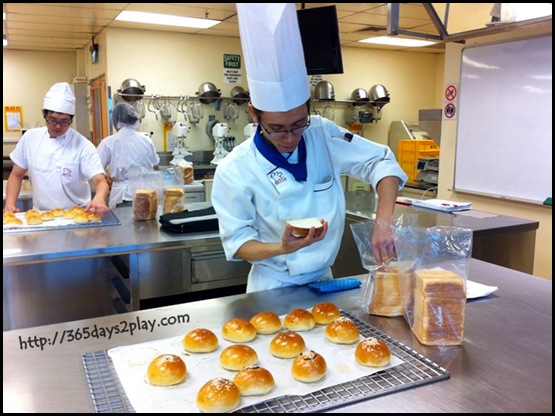
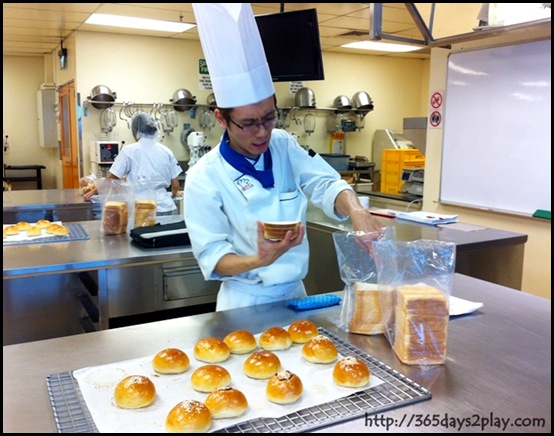

Hi,
Im thinking of taking up Certificate of Proficiency in Baking part-time, can you share how is it like? Is the place conducive and how’s the modules taught? Do they use a lot of preservatives or pre-made ingredients in the classes?
Many thanks!:)
Hi Wen!
The Certificate of Proficiency in Baking is broken up into 3 modules (cake, bread, pastry).
1. First of all, I would advise you to sign up on a per module basis. If they offer you discount for signing up for 3 modules, you can still pay for 1 module first, but just tell them u intend to go for the full cert. If you change your mind, you have to refund them the discount.
2. Mine was full time so we made about 3 to 4 products a day (8am – 4.30pm), plus 1 hr or so of theory. For part-time, it means you will do roughly half of what I did per evening that you attend.
3. There is less emphasis on theory and there is a lot of hands on. Depending on the chef, some will go through the 1 hr theory first, then hands on all the way. Also, the chef may demonstrate a little before the students start. The demonstrations usually won’t last very long, and in fact, sometimes no demonstration. As and when the chef feels that the class is at a difficult part, he will step in to demonstrate a little on the spot, or take over 1 student’s work to demonstrate.
4. The school is pretty no frills. All ingredients are provided, but u must bring your own tool bag (knives/spatulas etc). The mixers are industrial size, not the cutesy kitchenaid kind. At first it feels ugly, but after a while, you will find that kitchenaid is too small.
5. The ingredients I had issue with were mainly sponge gel and palm oil for cake class, bread improver and margarine/shortening for bread class, and margarine/shortening for pastry class. No pre-made ingredients are used. I had a huge issue with using so much margarine, but one way to solve this is to bring your own butter. Another way is to just think that you are learning the skills so when you repeat at home, you can just use butter instead.
6. At BITC, you will have to wear a uniform! But I believe most other schools require you to do so as well for long courses. Also, you will have to do your own washing up. This is especially siong for cake class as the batter is sticky and oily and tons of measuring bowls are used. And everyone has to mop the floors, clean the tables, clear the ingredients area etc, based on the duty roster.
7. One impt point to note is that the cert isn’t just to teach you home baking. The cert is also for people who wish to become bakers, so all the products done are on a larger scale and involve using the mixer. As long as you have a good mixer at home, you should be able to replicate all the products. Ok with the exception of the bread proofer cabinet, which I’m sure no household will have (there are ways to create a makeshift one)
Hope this helps! Do let me know if you need further clarification. And if you call up the school, do mention you read about BITC on my blog!:)
Did I mention, there is a mid-term and a final term exam per module! Yippeeeee!
hi!
Thanks so much for all the clarifications!
haha im interested in improving my baking skills, and to find someone to answer all my whys (like how come using this ingredient first will make the cake rise better etc). I tried to find for part-time courses but cld only manage to find BITC and CerealTech =x. yea i dont like the idea of using sponge gel etc too, but can we omit that at home n still get nice cakes?
haha kays i’ll call up e sch soon, there’s a pastry making starting on 23/5 and bread making on 30/7. still thinking of which one to start first =)
Sorry for the late reply. Did you start on the pastry making class in the end? Of the 3 classes, I liked the pastry class the least, mainly because alot of the items are stuff I shouldn’t eat on a regular basis such as cookies and pies. Also, they just don’t look at impressive as cakes, and not as “useful” as bread. Bread making’s definitely the 1st class to go for because it’s more idiot proof than cake making, and something you would eat on a daily basis.
Regarding the sponge gel, not all the recipes taught at the school require that so it fine for replication at home. U cannot directly omit the sponge gel if a recipe calls for sponge gel. You would have to source for a recipe that does not contain sponge gel at all if you don’t want to use sponge gel. I would say that sponge gel is to allow for idiot proof cakes, ie, even without skill, the cake will be light and fluffy. So once you acquire the skills, your cake would be quite close to a sponge gel type of cake in terms of texture, but far superior in terms of taste. A sponge gel cake is often worse in taste, as sponge gel requires less eggs.
Hi,
I happen to chance upon this blog when i am searching info on BITC course. I am interested to take up the course on diploma on pastisserie in BITC. But i am unsure if this is better or the other diploma in baking and pastry arts? I have not taken the certification bakery courses conducted by BITC. I am working full time too and hence only attend classes on weekend. I do bake when i am free and hope i can learn more baking techniques and obtain professional baking certs.
Looking forward to you advice.
Cheers,
Dariel 🙂
Hi Dariel,
I did not take the diploma. I believe the diploma on patisserie is issued by City and Guilds (UK) while the Diploma in Baking and Pastry Arts is a diploma issued by BITC itself. Both will be taught by BITC lecturers. The main difference would be that the City and Guilds cert is very much shorter in duration, so that means less products will be taught. Cost is cheaper too. If you want a diploma ASAP, get the City and Guilds one. If you want to have a really wide appreciation of baking, get the BITC diploma.
My advise is that you should email BITC and get them to send you the course outline for both diplomas, on a lesson by lesson basis. Then you will be able to judge which one you like more. If you just wanna bake bread, cake and pastry, City and Guilds would be enough, cuz the BITC diploma covers things like Asian Pastries, wedding cake decoration etc, a very holistic coverage.
Or if you don’t care about whether you have a “diploma” or not, you could always sign up for the Certificate in Baking (Cake, Bread and/or Pastry) and decide if you need more after each module.
Hi,
Thanks a lot for the advice. I will think about it and decide. 🙂
Cheers,
Dariel
Hi,
I really enjoyed reading your blog. I’m interested in taking the certification of proficiency in baking. I’m wondering if you wrote down anything about pastry class? What products were baked in this class?
Thanks
Vann
Hi there! I read your exciting blog on your adventures in BITC 4 years back. Really love to read them. By any chance, you have a link to your pastry class review? I can only managed to find cake and bread making. I am considering to learn bread making proficiency course. However, your blog made me reconsider about cake making instead! I am thinking can those skills be directly applied to home baking? For example changing the recipie that uses shortening to other forms of fats or margarine to butter? Thanks!
Hi Patrick,
Aside to what I’ve replied to you via IM, regarding the recipe, it’s not really possible to simply substitute the ingredients, without knowing the exact ratio. You can ask the chefs if they are able to do so, but I think it would just be easier if you obtained a recipe using butter from the start. The crux of the class is to learn the skills, so that you can replicate with any type of recipe you see in the future.